Sacha Jones's Blog, page 8
December 26, 2017
Catnip Christmas
 Mother TT guarding the nip.So... we bought a new plant for the garden and it turned out to be CATNIP. Our two resident cats are obviously pretty happy about the situation, one of them, TT, is pictured guarding said nip here.
Mother TT guarding the nip.So... we bought a new plant for the garden and it turned out to be CATNIP. Our two resident cats are obviously pretty happy about the situation, one of them, TT, is pictured guarding said nip here.The other, Trixie, her daughter no less, has shown an interest.
Otherwise we, the owners of the garden and chief purchasers and planters of all and sundry pants, are happy enough about the arrangement of the plant designed to grow wild and spill down the low hill onto the brick path, which it more or less does.
The fact that we didn't know it was Catnip raises the Christmas surprise element significantly. Surprise is king at Christmas and here we have mastered surprise, TT and her daughter Trixie had no idea we were bringing home catnip for Christmas. Much harder to surprise the children.
 Daughter Trixie,
Daughter Trixie,watching the nip from a close distance.
Anyway, we are happy with the result, two happy cats and a garden that looks suitably rambling and wild, which is what I wanted in adding the plant that would turn out to be catnip.
Everyone is more or less happy, the best you can ask for in this day and age.
Meow.
Love to know what it is about the catnip that they like so much...
Published on December 26, 2017 23:53
December 22, 2017
Time to end
 A family of two young girls (8-9yrs) and their mother built this
A family of two young girls (8-9yrs) and their mother built thison Takapuna Beach yesterday. It's time to end the year and maybe the blog. I am feeling overworked and it is probably time to move on to a more integrated image, site and message for Sacha Jones Comedian. This blog gets a little too "political" for that image and message, at least for some people's tastes, not mine, but some. So fair enough. Time to ditch "the political" and rock the comical! Are you ready??? I hope so.
So the very best of the season and end of year and New Year to all of you! And a Happy Christmas Day for those who are into Santa. I hope to see you again via my integrated web presence in the future if this is indeed my last blog post. It is certainly my last of the year.
I am, I confess, into Santa and the whole nine yards of red tinsel and spiky holly and too-tasty chestnut stuffing mainly, I think, because of childhood associations. Everyone wants to be transported back to their childhood from adulthood when you have lost the childhood freedom to not know who you are yet and so to be all sorts of different people while more looking out than looking in.
That is the freedom of the child and that is why I love working with preschool children. There is so much creativity in them. So much fun, so much freedom, so much curiosity, so much energy, so much life! I just adore them all. It is a total thing for me and even older children right through to teens and early 20s.
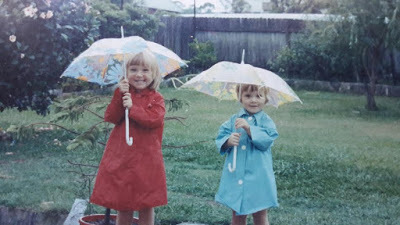 New Christmas umbrellas in Sydney 1970-something.
New Christmas umbrellas in Sydney 1970-something. I (older sister) was VERY happy. I am into older people too, quite a fan of the human being in general, though I am not quite as much into older humans because of their (our) mainstreamed and streaming traits. But still very much I love them (us) for their (our) endurance, our experiences and our readiness to laugh at ourselves, something most of us couldn't do when we were younger. I know I couldn't.
So a very Happy Christmas!!!!!!!!!! May you get at least one thing that you want and or need under the tree and have some fun food time with the people you care about.
Published on December 22, 2017 22:34
December 18, 2017
Little Lies Tell One BIG Truth

 Spoiler alert: In this year's award-winning HBO miniseries,
Big Little Lies
based on the 2014 book of the same name by
Australian author Liane Moriarty
(who happens to be my exact age, emanates from my home town and is basically living my ideal life - but I am not jealous) we finally have the truth told about domestic violence on our screens. And about bloody time!
Spoiler alert: In this year's award-winning HBO miniseries,
Big Little Lies
based on the 2014 book of the same name by
Australian author Liane Moriarty
(who happens to be my exact age, emanates from my home town and is basically living my ideal life - but I am not jealous) we finally have the truth told about domestic violence on our screens. And about bloody time!As someone who has also written at length (though in an academic context) about domestic violence, and who knows the frustrating battle it is for women victims of domestic violence to be believed if and when they finally find the courage to risk their lives and tell their truth, an injustice that underpins and reflects all the other unjust abuses that women are made to suffer in our world, I feel that this cinematic truth-telling could be a game-changer for the world of women (and men).
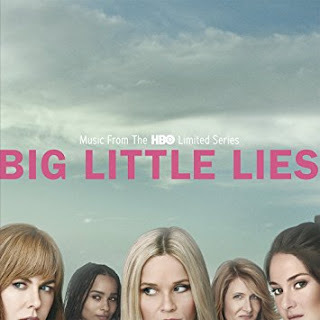 One of the biggest lies that has been told by men who have gone out of their way to cover up the truth about domestic violence - and many have, including one of the leading criminologists in this country - that women in relationships are just as violent as men and the finger-pointing at men is just another way to deflect blame for this violence from women onto men, is particularly beautifully exposed in this series.
One of the biggest lies that has been told by men who have gone out of their way to cover up the truth about domestic violence - and many have, including one of the leading criminologists in this country - that women in relationships are just as violent as men and the finger-pointing at men is just another way to deflect blame for this violence from women onto men, is particularly beautifully exposed in this series.At one point one of the minor male characters says: 'I think women are chemically incapable of forgiveness', a line that echoes Shakespeare's 'Hell hath no fury like a woman scorned'. This oft told lie about women that is also part of the denial of the viciousness of men's fury and vengeance - especially when it comes to women - is also put to rights in this series, with the women shown to be essentially too forgiving of violent, weak men, and in the end, ultimately forgiving of each other, whereas the men, most of them, remain caught in their anger and unwillingness to forgive.
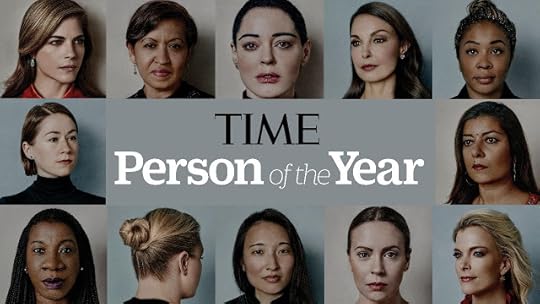
As the truth (and the lies) about women and men is coming out all over the place this year, it seems more than ever before, and with a real momentum towards truth-telling building as symbolised in TIME's naming the women (mainly) who have spoken out about male sexual abuse as this year's Person of the Year , I think we are on the brink of real and revolutionary change towards a gender justice the likes of which the world has never seen.
Revolution is a big word, but then again so is truth, and if we want the latter we had better be prepared for the former. Some of us have been prepared for years, decades, centuries and millennia...
Published on December 18, 2017 16:43
December 13, 2017
Cat Person
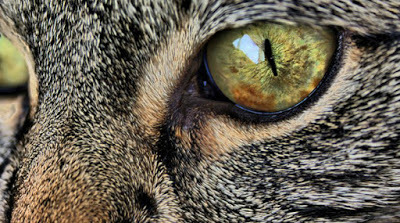 So last night I had what I would call a negative gender experience when a mature-age male stand-up comedian in the line-up I was part of later on in the night called his teenage daughter "bitch" and the mostly male audience laughed.
So last night I had what I would call a negative gender experience when a mature-age male stand-up comedian in the line-up I was part of later on in the night called his teenage daughter "bitch" and the mostly male audience laughed.What does this have to do with cats?
Well nothing much directly. Except that the short story "Cat Person" published this week in New Yorker magazine (a story that doesn't have much to do with cats either) is about a different but similarly negative gender experience between a woman and a man, written from the woman's point of view. And going by the massive 'viral' reaction to it by women who relate (mostly) and men who object (mostly) and find the story misandrist, I got to thinking once more about the pervasiveness of this gender divide and how it cannot possibly be what we are stuck with, and that if it is, we are definitely doomed to mutual unhappiness and, ultimately, destruction.
"Cat person" is an extremely real and unsensationalised story of an unhappy sexual encounter that is the culmination of a six-month courting experience mostly conducted in a series of texts between a young woman (20) and an older man (34). The theme is simple enough but it is told by the woman narrator in a way that somehow cuts brutally to the heart of the male-female disconnect we have not seen done quite as clearly and cleverly before.
The man in the story makes so many mistakes against his own self-interest in what he says/doesn't say and does/doesn't do once they meet up before, during and after sex - if his purpose is to have a long-term relationship with the woman, which it is - and the woman, seeing all these mistakes and being disappointed and put off, nonetheless acts against her better judgement and self interest by initiating sex with a man she has pretty much decided is not the witty charming 'cat person' she had thought and hoped he was.
In the end, not only does a relationship not develop but both parties are quite seriously wounded by the experience, yet they both actively orchestrated and self-sabotaged it. WHYYYYYYYYYYYYY?
Why? Because women read (and write) romance and erotica and men watch (and make) aggressive, misogynistic porn, and never the twain shall happily meet as long as these gender-dividing practices continue.
Why? Because the clitoris is deceptively hard to please and too many men resent and fear having to work out how to please it - to the point of cutting it off to take it out of the equation entirely.
Why? Because women generally take too much of the responsibility for this deceptive difficulty (it really is not that hard to please) and are typically too forgiving of men who struggle with the challenge and the wider one it symbolises of having to get to know women.
After reading this story I want to say to men: Just trust us to like you and be forgiving (indeed too forgiving of your weaknesses), and in exchange be prepared to do all that you can to try and figure out what makes us happy, before, during and after sex. Mostly this requires paying way more attention than you typically do to the signals we give off, including the words we speak, and asking what we mean if you are confused. Please ask rather than assume, and pretty please don't take your cues from porn!
This seems a fair exchange and the exchange that nature intended (except for female over-forgiveness, which is a survival mechanism developed from living in a man's world that makes too many excuses for male ignorance of womankind) and is the exchange that nature depends upon to take us forward into a post-misogynistic world in which men and women actually get on and everyone is a whole lot happier, cat and dog people alike.
And don't call us bitches - we're not dogs. Meow.
Published on December 13, 2017 14:00
December 6, 2017
The POWER (book review)
When I look at this image I see a clitoris with finger poised...

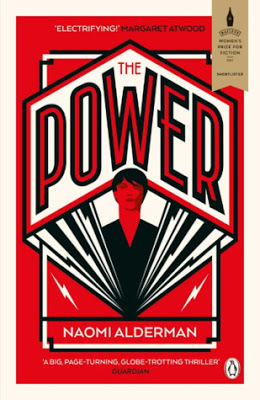 ...and so I thought it an apt image to accompany my post on
The Power by Naomi Alderman,
the 2017 Women's Prize for Fiction winner that I've just finished reading.
...and so I thought it an apt image to accompany my post on
The Power by Naomi Alderman,
the 2017 Women's Prize for Fiction winner that I've just finished reading.
The actual book cover doesn't do much for me personally, and if I had the power I would suggest this image replace it for the next reprint. Alas, I do not have the power.
Alderman's dystopian feminist(ish) novel asks: "What might a world look like in which women are the ones to be feared?" as one reviewer puts it, fairly accurately.
As a freelance political theorist who has given a good amount of thought to the question of what the world might look like if women had power equal to or more than men, I am always interested in this question and, as it happens, am currently engaged in writing my very own fictional answer to it.
But feared? I'm not sure this is the answer, or rather the question we need to take our feminist mission forward. Surely fear is what we want to move beyond.
Alderman's book essentially flips the balance of power in favour of women by giving women greater physical strength than men, and suggests that with that strength women would end up, eventually, after righting a few wrongs, just as violent and frightening as men have become in our world.
Just as men have appropriated their superior physical strength to use against women in the real world - the last thing nature surely intended it for - so, Alderman speculates, womankind would do the same with their power, even to the point of losing the nurturing instinct and inflicting pain on children and the vulnerable for the fun of it, because they can. Because it makes them feel powerful. Power corrupts absolutely.
The mindflip Alderman achieves by putting the reader in a world where men fear women and women don't have any need to fear men, is kind of satisfying to read and very effective for highlighting the injustice of men's ongoing abuses of power at women's expense. But unfortunately the price to pay is that women's power has to turn, eventually, into a comparable corruption where fear and violence rule and the gentler virtues of compassion and empathy are lost, or rather that men become known for these gentler virtues and women for their aggression and ambition.
Perhaps there is something in the idea that it takes an oppressed person to feel compassion for those who are suffering, which might help to explain why women are responsible for three times the amount of charitable donations as men are, despite the gender wage gap working in men's favour. And perhaps men denied their sense of power and entitlement might too develop more sympathies for the oppressed and vulnerable.
Still, this gender flip is too absolute and too convenient to send an effective feminist message, in my view. Women in power have shown an ability to retain their compassion and fight for justice, not all of them of course, but a far greater percentage of them than men in positions of power. Albeit these women have never had as much power as the men in the same positions, as male power has always been backed by the pervasive institutions of cultural patriarchy that make even the least powerful of men feel more powerful than women.
So there is no way to look at our world, past and present, and say what female power would look like. So speculation is required.
But it seems to me it is too easy, and not at all fair to speculate, as Alderman essentially does in this book, that power would go to women's heads and make us just as violent and power-mad as it has made men.
Let's bloody hope this is not the case, at least.
Still, I reckon men who are in any doubt about the abuses of power that they have perpetrated against women, could benefit from reading this book. Unfortunately I suspect it will have a mainly female readership, if for no other reason that men don't often read books written by women, least of all a book billed as feminist.
Ignorance is power. But perhaps not ultimately. I'll get back to my book now to try and prove that; power to the pen.

 ...and so I thought it an apt image to accompany my post on
The Power by Naomi Alderman,
the 2017 Women's Prize for Fiction winner that I've just finished reading.
...and so I thought it an apt image to accompany my post on
The Power by Naomi Alderman,
the 2017 Women's Prize for Fiction winner that I've just finished reading.The actual book cover doesn't do much for me personally, and if I had the power I would suggest this image replace it for the next reprint. Alas, I do not have the power.
Alderman's dystopian feminist(ish) novel asks: "What might a world look like in which women are the ones to be feared?" as one reviewer puts it, fairly accurately.
As a freelance political theorist who has given a good amount of thought to the question of what the world might look like if women had power equal to or more than men, I am always interested in this question and, as it happens, am currently engaged in writing my very own fictional answer to it.
But feared? I'm not sure this is the answer, or rather the question we need to take our feminist mission forward. Surely fear is what we want to move beyond.
Alderman's book essentially flips the balance of power in favour of women by giving women greater physical strength than men, and suggests that with that strength women would end up, eventually, after righting a few wrongs, just as violent and frightening as men have become in our world.
Just as men have appropriated their superior physical strength to use against women in the real world - the last thing nature surely intended it for - so, Alderman speculates, womankind would do the same with their power, even to the point of losing the nurturing instinct and inflicting pain on children and the vulnerable for the fun of it, because they can. Because it makes them feel powerful. Power corrupts absolutely.
The mindflip Alderman achieves by putting the reader in a world where men fear women and women don't have any need to fear men, is kind of satisfying to read and very effective for highlighting the injustice of men's ongoing abuses of power at women's expense. But unfortunately the price to pay is that women's power has to turn, eventually, into a comparable corruption where fear and violence rule and the gentler virtues of compassion and empathy are lost, or rather that men become known for these gentler virtues and women for their aggression and ambition.
Perhaps there is something in the idea that it takes an oppressed person to feel compassion for those who are suffering, which might help to explain why women are responsible for three times the amount of charitable donations as men are, despite the gender wage gap working in men's favour. And perhaps men denied their sense of power and entitlement might too develop more sympathies for the oppressed and vulnerable.
Still, this gender flip is too absolute and too convenient to send an effective feminist message, in my view. Women in power have shown an ability to retain their compassion and fight for justice, not all of them of course, but a far greater percentage of them than men in positions of power. Albeit these women have never had as much power as the men in the same positions, as male power has always been backed by the pervasive institutions of cultural patriarchy that make even the least powerful of men feel more powerful than women.
So there is no way to look at our world, past and present, and say what female power would look like. So speculation is required.
But it seems to me it is too easy, and not at all fair to speculate, as Alderman essentially does in this book, that power would go to women's heads and make us just as violent and power-mad as it has made men.
Let's bloody hope this is not the case, at least.
Still, I reckon men who are in any doubt about the abuses of power that they have perpetrated against women, could benefit from reading this book. Unfortunately I suspect it will have a mainly female readership, if for no other reason that men don't often read books written by women, least of all a book billed as feminist.
Ignorance is power. But perhaps not ultimately. I'll get back to my book now to try and prove that; power to the pen.
Published on December 06, 2017 14:41
December 2, 2017
Melodrama: No White Men
and only one New Zealander...
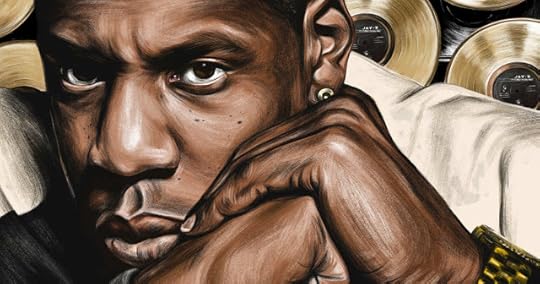 Jay Z's album '4.44' nominated for Album of the Year 2018
Jay Z's album '4.44' nominated for Album of the Year 2018
So, in this breaking, 4-day old news that I have just become aware of due to events in my little life intervening - including an allergic reaction to soap - it would seem that for the first time in history no white men have been nominated for Album of the Year.
Is it the first time in history that no white men have been nominated for any major international award in any category of endeavour whatsoever? I don't know, but this seems quite likely, too.
So this is news.
According to a Washington Post music critic last year:
“For the past five years, black artists have been making era-defining pop music, some of which has been nominated for the heaviest Grammy in the land, album of the year... [but] then, when ‘music’s biggest night’ eventually rolls around, each and every one of these artists loses to a white act doing less-challenging, less-timely, less-imaginative work.”
 Lorde's album 'Melodrama' nominated for Album of the Year 2018So I guess the voters have made sure that won't be happening next year, unless... the only woman nominated wins, for she is white.
Lorde's album 'Melodrama' nominated for Album of the Year 2018So I guess the voters have made sure that won't be happening next year, unless... the only woman nominated wins, for she is white.
The fact that there is only one woman nominated out of five nominees for best album is less noteworthy for those in the international media. Much less do they care that she hails from a little known land in the south pacific, and much less still do they care that she went to the same school as my daughter and danced in the same dance group!
And perhaps this is all fair enough - even if these things are a big deal to me, almost as big as my recently discovered soap allergy, which could be a pretty big stink going forward.
Still, for that one woman (Lorde) to be the only white nominee puts her in a pretty unenviable, no-win position, knowing that if she does wins for her unique brand of 'era-defining' pop music the decision will be seen as racist.
The stats on the number of black artists awarded Best Album are pretty bad and last year when Adele won over Beyonce, she herself said it was an outrage, echoing the general sentiment, and the same the year before when another white woman (Taylor Swift) won over a black artist, this time a man (Kendrick Lamar).
The stats for the number of women who have been nominated or won the award in its 59 years are not collated, but I would be surprised if women weren't very much in the minority. Only three black women (not including Aretha Franklin or Nina Simone) and nine black men have won the Best Album award, which is just over a fifth in total, and given the pioneering role of black artists in the US pop music industry which judges these awards that seems pretty shameful.
Still, that black men have won this award four times as often as black women - and I doubt the stats for white men and women are any different - given that women make up 50% of all populations, if not perhaps that number of recorded pop artists as it is likely that more men continue to be signed to record deals than women, and certainly that would have been true in the early years of the Grammys - suggests that sexism, like racism, is alive and well in the pop awards industry, despite the last two year's winners.
I suspect Lorde's 'Melodrama' is in the line-up for top album next year as the token woman and white person least likely to cause a scandal when she doesn't win - or even if she does. I think even she, like Adele last year, will be hoping that she doesn't.
It's tough being a woman of any colour or creed, with or without a soap allergy. And that could be catchy song lyric, watch out Grammy!
 Jay Z's album '4.44' nominated for Album of the Year 2018
Jay Z's album '4.44' nominated for Album of the Year 2018So, in this breaking, 4-day old news that I have just become aware of due to events in my little life intervening - including an allergic reaction to soap - it would seem that for the first time in history no white men have been nominated for Album of the Year.
Is it the first time in history that no white men have been nominated for any major international award in any category of endeavour whatsoever? I don't know, but this seems quite likely, too.
So this is news.
According to a Washington Post music critic last year:
“For the past five years, black artists have been making era-defining pop music, some of which has been nominated for the heaviest Grammy in the land, album of the year... [but] then, when ‘music’s biggest night’ eventually rolls around, each and every one of these artists loses to a white act doing less-challenging, less-timely, less-imaginative work.”
 Lorde's album 'Melodrama' nominated for Album of the Year 2018So I guess the voters have made sure that won't be happening next year, unless... the only woman nominated wins, for she is white.
Lorde's album 'Melodrama' nominated for Album of the Year 2018So I guess the voters have made sure that won't be happening next year, unless... the only woman nominated wins, for she is white.The fact that there is only one woman nominated out of five nominees for best album is less noteworthy for those in the international media. Much less do they care that she hails from a little known land in the south pacific, and much less still do they care that she went to the same school as my daughter and danced in the same dance group!
And perhaps this is all fair enough - even if these things are a big deal to me, almost as big as my recently discovered soap allergy, which could be a pretty big stink going forward.
Still, for that one woman (Lorde) to be the only white nominee puts her in a pretty unenviable, no-win position, knowing that if she does wins for her unique brand of 'era-defining' pop music the decision will be seen as racist.
The stats on the number of black artists awarded Best Album are pretty bad and last year when Adele won over Beyonce, she herself said it was an outrage, echoing the general sentiment, and the same the year before when another white woman (Taylor Swift) won over a black artist, this time a man (Kendrick Lamar).
The stats for the number of women who have been nominated or won the award in its 59 years are not collated, but I would be surprised if women weren't very much in the minority. Only three black women (not including Aretha Franklin or Nina Simone) and nine black men have won the Best Album award, which is just over a fifth in total, and given the pioneering role of black artists in the US pop music industry which judges these awards that seems pretty shameful.
Still, that black men have won this award four times as often as black women - and I doubt the stats for white men and women are any different - given that women make up 50% of all populations, if not perhaps that number of recorded pop artists as it is likely that more men continue to be signed to record deals than women, and certainly that would have been true in the early years of the Grammys - suggests that sexism, like racism, is alive and well in the pop awards industry, despite the last two year's winners.
I suspect Lorde's 'Melodrama' is in the line-up for top album next year as the token woman and white person least likely to cause a scandal when she doesn't win - or even if she does. I think even she, like Adele last year, will be hoping that she doesn't.
It's tough being a woman of any colour or creed, with or without a soap allergy. And that could be catchy song lyric, watch out Grammy!
Published on December 02, 2017 14:23
November 30, 2017
The Goddess Myth
 So last week's
TIME cover story 'The Goddess Myth'
on the increasing pressure to be the perfect mother was told with motherhood represented with several images of a fairly discretely naked woman and child/children, images taken by the woman's husband and the father of the child/ren,
Erick Madigan Heck
.
So last week's
TIME cover story 'The Goddess Myth'
on the increasing pressure to be the perfect mother was told with motherhood represented with several images of a fairly discretely naked woman and child/children, images taken by the woman's husband and the father of the child/ren,
Erick Madigan Heck
. This week some objections were aired in TIME's letters to the editor. One genderless person called 'R. Mortenson' from Phoenix was outraged by the cover appearing in the wake of the Weinstein scandal and wrote:
'We are kidding ourselves if we think we can indulge in viewing provocatively dressed or nude women and not have it carry over into our attitudes and behaviour... of sexual predation.'
Really? This person is connecting an image of maternity with Weinstein's sexual perversions, abuses of power and violence? Has it really come to that? Have women really lost all freedom to show our bodies in their natural state, discretely - it's not Playboy - without men being tempted to assault and harass us and if not, that is our problem? I call bullshit to that.
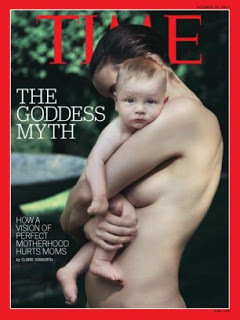 These images are so natural and so non-provocative, having absolutely nothing to do with sex and everything to do with the simple joy and beauty of motherhood, and womanhood, that to even mention that man's name in the same context seems like a kind of assault all of its own, and a further victimisation of women and womanhood and implied victory for men like him.
These images are so natural and so non-provocative, having absolutely nothing to do with sex and everything to do with the simple joy and beauty of motherhood, and womanhood, that to even mention that man's name in the same context seems like a kind of assault all of its own, and a further victimisation of women and womanhood and implied victory for men like him.Haven't they got enough power already? They do, and so they must be allowed to degrade motherhood and womanhood further still.
Indeed I think it is quite likely part of the reason why TIME chose to celebrate motherhood in this way, as a reclaiming of the beauty and power of womanhood as something that women (and children, and men who aren't perverted sexual predators) can enjoy - albeit not helped by the modern pressures to be perfect. In these images, there is no pressure at all, which also works as a welcome counter to the story's theme of society expecting too much of women and mothers.
Another detractor, an Australian woman or man called Kerry, protested:
'Why is the woman on your cover naked? I never saw my mother naked, yet...she was the personification of motherhood...'
These images are not about showing off women's flesh for the sake of it, Kerry. They are about, I like to think, showing womanhood and motherhood in their most natural and powerful state, neither adorned with religious iconography nor twisted and objectified for men's pornographic gratification.
This woman chose to be photographed naked with her young sons and that should be her choice. That TIME chose to represent motherhood that way, indeed in a story about the stresses of motherhood, is their choice and I appreciate them both for making those choices, along with the husband-father photographer for taking such striking images of human beings, female and male, living in their natural, happy and loving state.
Thank you TIME for your most timely story.
Published on November 30, 2017 18:01
November 24, 2017
Women's Lives Matter
 Reeva Steenkamp (30) shot to death by her boyfriend (SA)
Reeva Steenkamp (30) shot to death by her boyfriend (SA)
 Sophie Elliot (22) stabbed to death by her boyfriend (NZ)
Sophie Elliot (22) stabbed to death by her boyfriend (NZ)
 Emily Longely (17) strangled to death by her boyfriend (UK)The men who killed these young women, their girlfriends at the time, all claimed that it wasn't their fault; two said it was the woman's fault and one said he mistook his victim for an intruder.
Emily Longely (17) strangled to death by her boyfriend (UK)The men who killed these young women, their girlfriends at the time, all claimed that it wasn't their fault; two said it was the woman's fault and one said he mistook his victim for an intruder.The law courts in each country let the killers - dressed smartly in suit and tie - have their say, at length, providing a legal framework in which their excuses and victim-blaming could be heard, and in two of the cases the courts considered the women's actions mitigated the seriousness of the killings.
In one case the killer was given the benefit of the doubt and believed, with the female judge handing down a substantially reduced sentence than the minimum for murder. After serving just ten months in prison that woman-killer was released on home detention.
But this week the Supreme Court doubled his sentence duration to the minimum 15 years for murder, of which he will have to serve at least half, so seven and a half years.
This still seems too short for pre-meditated murder and an elaborately fabricated non-guilty plea, but it is something that the previous, much shorter sentence was overturned four years on. Indeed it sends the message that this year, in one country at least, and I think in many other countries, too, women's lives are being seen to matter more than they used to just a few years ago.
Having studied male partner violence for many years and paid attention to the public trials of men who kill their female partners - most of which cases are never made public - I am quietly optimistic that the world is waking up to believing what it has taken the world so long to believe, that women's lives matter as much as men's do.
Published on November 24, 2017 20:46
November 19, 2017
Listen, Louie
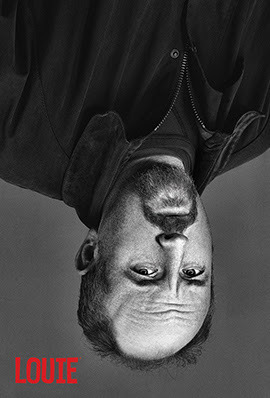 So
the last blog post I did on Louis C.K
back in August 2016, I used the image of him appearing as a guest on a chat show over the caption (of his making, not mine) 'Comedian/Masturbator'...
So
the last blog post I did on Louis C.K
back in August 2016, I used the image of him appearing as a guest on a chat show over the caption (of his making, not mine) 'Comedian/Masturbator'...In the post I expressed some feminist objections to the content of his 2015 Netflix special (now pulled), including his elaborate mime of making a female rat orgasm that was little more than an extended mocking of the clitoris - I can (and do) do that for comic effect, but he, a man, cannot - as well as his expressed opinion in that special that racism is wrong but sexism isn't, it's just 'men and women giving each other a hard time'; hard indeed.
But about that caption I wrote:
"'Comedian/Masturbator' is funny, especially as 'masturbator' is not even a word, at least not according to my spellchecker. It should be. Next to it you could write: Louis (or Louie) C.K."
Alas, the last part of this comment is now been shown to be all too true; you could write Louis C.K. in the dictionary next to the word masturbator - if it were a word.
But the first part about the caption: 'comedian/masturbator' being funny, is now very much not true. When you force young women to watch you masturbate, as he has finally admitted doing on numerous occasions over numerous years, you go from being a slightly sad funnyman who, in his middle age, still can't take his hand off his own cock, to a sick unfunnyman who gets off making women squirm in disgust, humiliation and intimidation being made to watch a man who has power over them jerk off.
And so it seems I was right to call him out on reducing sexism to a fair fight and spat between men and women, and for making a joke of the female orgasm and clitoris, but wrong to think his sad obsession with his own penis was in any way funny. It is not, the two things are, we now know, directly connected as part of his sexist dismissal and objectification of women as tools for his own pleasure and power.
So listen up Louis (Louie), having finally confessed to this sick obsession with making women comedians watch you jerk off, so sick and offensive that some of these women left the comedy business rather than have to endure it, you said: "I have spent my long and lucky career talking and saying anything I want. I will now step back and take a long time to listen."
Indeed you have spent a long time talking, saying AND DOING anything you want, Louis, and it is time you listened - TO WOMEN. Men like you spend such a lot of time, on stage, in books, in the home, on the street and in the workplace, making fun of how hard women are to understand, often to the point of suggesting that there is something (almost everything) wrong with us, including that we don't have a sense of humour. But in fact the problem is with men not bothering, and not being made to bother, to listen to women and actually learn more than the basic outline of who we are, in our wide variety, so that you might figure out how to treat us like human beings.
 Comedian Jen Kirkman, who is hilarious, and who has worked with Louis and endured his sick obsession personally because she knew that if she resisted and spoke out about it her career would be over, wrote this on Twitter in response to CK's outing as a pervert by other women:
Comedian Jen Kirkman, who is hilarious, and who has worked with Louis and endured his sick obsession personally because she knew that if she resisted and spoke out about it her career would be over, wrote this on Twitter in response to CK's outing as a pervert by other women:'When women speak, don't sensationalize it and make it about naming the man. Our stories run deeper. It's our culture that damns us if we do or don't or shames us if we have made peace. It's time to listen to how women want this to be talked about. The end.'9:43 AM - Nov 10, 2017
The beginning, too, I hope.
Published on November 19, 2017 13:15
November 15, 2017
The right to love
Published on November 15, 2017 07:54









